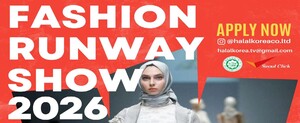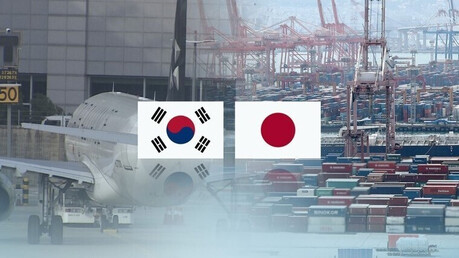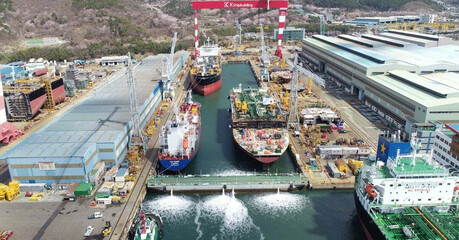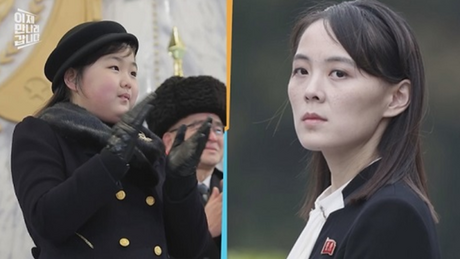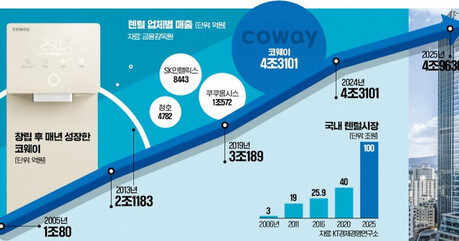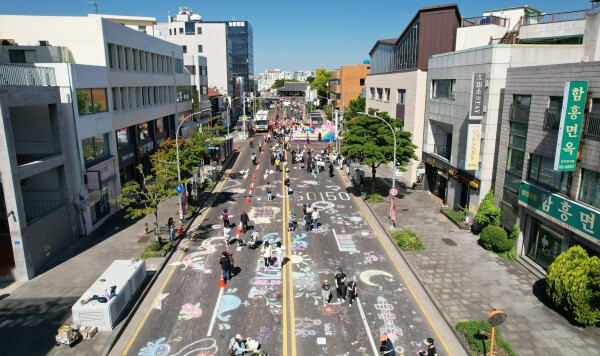
On April 26th, the "Car-Free Street Walking" festival unfolded in the old downtown area of Jeju City, drawing an estimated 12,000 participants, including local residents and tourists, under clear, sunny skies.
Hosted by the Jeju Special Self-Governing Province, the event aimed to promote a walking culture, rediscover the nostalgic charm of the old downtown, and foster a pedestrian-centered environment.
The designated 3.5-kilometer walking course commenced at Tapdong Plaza, proceeded through Seomun Rotary, Gwandeokjeong Pavilion, Jungang Rotary, Shinhan Bank, Chilseongro Black Pork Street, and culminated at Tamna Culture Square.
From 7:00 AM to 1:00 PM, the road in front of Gwandeokjeong Pavilion, usually bustling with traffic, was transformed into a giant canvas. Children joyfully sprawled across the asphalt, creating impromptu artwork and turning the street into an unexpected playground.
The walking festival offered a diverse array of attractions beyond the stroll itself. Attendees could explore a photo exhibition showcasing the modern and contemporary lifestyle of the old downtown, embark on historical and cultural tours encompassing five different themes, engage with environmental awareness booths, and enjoy a captivating children's musical performance.
Seomun Rotary Plaza became a hub of dynamic activities, featuring lively group jump rope sessions and captivating Nori-gut (a traditional Korean shamanistic ritual play) performances. Meanwhile, the courtyard of Gwandeokjeong Pavilion hosted traditional folk games and a vibrant street parade, adding to the festive atmosphere.
The final destination, Tamna Culture Square, provided opportunities for participants to capture memorable moments with a "Life Four Cuts" photo booth and various photo zones.
Notably, Jeju Governor Oh Young-hun actively participated in the event, underscoring the commitment to carbon neutrality. He traveled from Ara-dong in Jeju City to Seomun Market by bus and then used an electric bicycle to reach Tapdong Plaza, the starting point of the walk.
Governor Oh remarked, "This festival allows us to rediscover the old downtown from a perspective we rarely experience, walking on roads usually occupied by vehicles. It is a celebration for all Jeju citizens who are embodying carbon neutrality." He acknowledged the inconvenience caused by the traffic restrictions but emphasized the larger goals of promoting a healthy Jeju, fostering local economic synergy, and practicing carbon neutrality, urging continued public interest and participation.
The event also marked the signing of a memorandum of understanding for a "Walking Donation Campaign," further amplifying its significance.
This campaign, set to run for seven months until the end of November, utilizes the mobile application "Walkon." For every 100 steps taken by participants, 7 KRW is accumulated as a donation. The ambitious goal is for Jeju residents to collectively achieve 5 billion steps, which would translate to approximately 350 million KRW in donations.
Ten prominent organizations and corporations joined this meaningful initiative, including the Jeju Free International City Development Center (JDC), Jeju Provincial Development Corporation, NH NongHyup Jeju Headquarters, Jeju Bank, Hallasan Corporation, Kakao, Neople, Jeju Semiconductor, Jeju Dream Tower Integrated Resort, and Jeju Donghwa Village.
This successful "Car-Free Street Walking" festival not only provided a day of enjoyable activities and community engagement but also highlighted the importance of sustainable practices, the revitalization of historical urban areas, and the power of collective action for charitable causes. The enthusiastic participation of residents and tourists alike signals a positive step towards a more pedestrian-friendly and environmentally conscious Jeju.
[Copyright (c) Global Economic Times. All Rights Reserved.]

